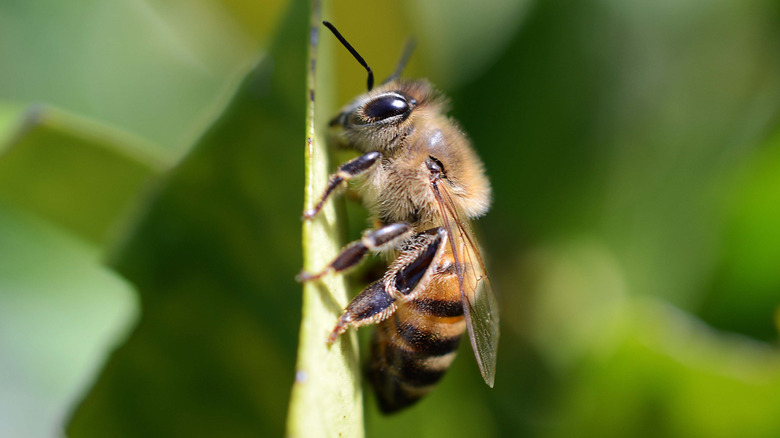The Invasive Pollinator That Is Slowly Spreading Across The Southern US (& What To Do About It)
If it feels like there's an uptick in invasive species across the U.S., you'd be correct. There are numerous non-native species growing in numbers, including Japanese beetles making a big return to certain regions of the country. It turns out that some seemingly beneficial pollinators are even causing harm. This includes Africanized honeybees (Apis mellifera scutellata), which are reportedly spreading across southern states and posing some serious risks along the way.
Africanized honeybees are descendants of African honeybees. These species were intentionally imported to South America from Africa to increase honey production in 1956. Along the way, they were also crossbred with European honeybees, a separate type of invasive honeybee. Just like the beginnings of any science-fiction movie plot gone wrong, the honeybees ended up escaping and made their way northward to North America. The Africanized honeybee has since garnered the nickname "killer bee" due to its aggressive behavior towards other insects, animals, and even humans.
The first U.S.-based Africanized honeybees were found back in 1990 within the state of Texas before spreading to Arizona and New Mexico in just two years. Now they are found in numerous areas along the sunbelt from California to Florida, and are located in at least 13 states overall. Scientists have learned that the honeybees cannot survive harsh winters in the north, which is why their growing populations are concentrated in these warmer regions, particularly in the southwest. There's also some concern that increasingly warmer temperatures might cause the bees to spread to normally cooler spots, too. An increasing Africanized honeybee population can, unfortunately, make dangerous interactions with people and animals more common.
What to do if you encounter Africanized honeybees in your area
It's, unfortunately, no coincidence that Africanized honeybees are nicknamed "killer bees." These are extremely aggressive species that may swarm people and animals they perceive as threats to their hives. They may even follow potential threats for a mile long. Yet at the same time, attacks on humans are uncommon, and seeing a single bee around your property is unlikely to cause a problem unless multiple bees are provoked.
Due to their growing presence, it's important to be aware of Africanized honeybees and to leave them alone. You should not attempt to get rid of the bees in your backyard. Since it can be difficult to tell the difference between this type of honeybee from other species, you might want to use caution around any honeybee you come across. They tend to sting only if they feel threatened, so it's important not to panic and alarm the bees any further. Move away quickly without making loud noises or exaggerated motions.
Also, if there's a beehive around your home, it's crucial that you call a pest control expert for help, which is the safest way to remove a beehive from your home's exterior. Trying to access an Africanized honeybee hive on your own can be a potentially deadly mistake. Isolated groups of the honeybees continue to be found across warmer regions in the U.S., with many smaller colonies successfully destroyed before spreading further. Stopping their overall spread is yet another reason why it's important to call for help if you suspect Africanized honeybees are around your home.

